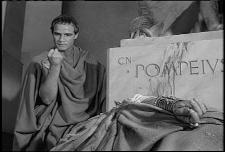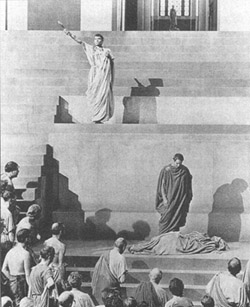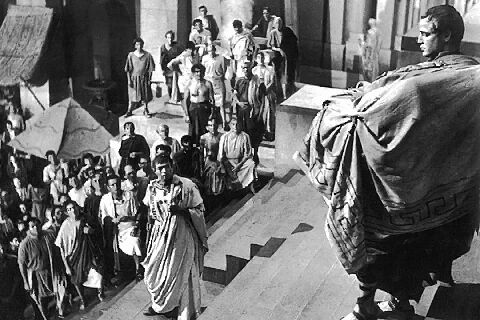Dr. Michael Delahoyde
Washington State University
JULIUS CAESAR
ACT III
SCENE i
Mid-March, 44 bce, and Caesar, Antony, and the conspirators arrive at
the Capitol. The "Ides of March" soothsayer is there, and Caesar snarks
about not being dead yet: "The ides of March are come"; "Ay, Caesar,
but not gone" (III.i.1-2). Caesar himself "is more persuaded of the
existence of the public Caesar than of the private man. One proof of
this is that he so regularly refers to himself in the third person, as
an institution rather than a man" (Garber 414).
Artemidorus tries to pass Caesar his letter, but Caesar, insisting that
matters pertaining to him personally come last in his priorities, refuses
to read it and enters the Capitol. Popilius wishes Cassius good luck with
his "enterprise to-day" (III.i.13), so Cassius has a moment of paranoia,
but needlessly, as Brutus notes Popilius smiling with Caesar. One
conspirator, Trebonius, strategically takes Mark Antony aside. Caesar
begins proceedings: "Are we all ready? What is now amiss / That Caesar
and his Senate must redress?" (III.i.31-32). His Senate? The other
conspirators join Metellus Cimber in begging Caesar to reverse the
decision on his brother's exile. Caesar refuses:
If I could pray to move, prayers would move me;
But I am constant as the northern star,
Of whose true-fix'd and resting quality
There is no fellow in the firmament.
(III.i.59-62).
"Some critics interpret this as absurd or arrogant, but it is true
gold; Caesar may idealize himself, and yet he is accurate" (Bloom 110).
Casca is the first to stab Caesar, saying, "Speak hands for me"
(III.i.76). Then the others attack, and Caesar delivers his famous last
words: "Et tu, Brute? -- Then fall Caesar" (III.i.77). Here, at last in
this play, is some real action. (Perhaps one reason we were not shown the
scene in which Caesar is offered a crown is that Shakespeare was saving
up real drama for now.) The conspirators shout, "Liberty! Freedom!" (not
unlike the reprehensible Caliban in The Tempest). Cassius amends
the recommended cry to "Liberty, freedom, and enfranchisement!"
(III.i.81), a rather cumbersome slogan.
Mark Antony has run home, and the people are behaving "As it were
doomsday" (III.i.98). Although Plutarch mentions only their bloodied
swords, Shakespeare's Brutus has the conspirators bathe their hands in
Caesar's blood: "Does this not give them all the precise appearance of
butchers?" (Asimov 287). The ceremony planned has them holding aloft their
swords and marching through the marketplace crying, "Peace, freedom, and
liberty!" (III.i.110). And blood is a great visual symbol for that, eh?
As they bathe in the blood, Cassius remarks, "How many ages hence / Shall
this our lofty scene be acted over / In states unborn and accents yet
unknown!" (III.i.111-113). Brutus rejoins, "How many times shall Caesar
bleed in sport, / That now on Pompey's basis lies along / No worthier
than the dust!" (III.i.114-115). Garber says that "what Cassius predicts
is nothing less than Shakespeare's Tragedy of Julilus Caesar, the
play we are now reading or watching" (Garber 419). But Brutus is the one
misunderstanding Cassius' actual political prophecy. They don't recognize
their disjuncture, for "while the first prophecy is political, the second
is theatrical" (Goddard, I 321). Indeed, Brutus is working in
spectacle at this point more than in savvy politics.
But first, Mark Antony requests a talk with the conspirators. He sends a
servant to feel out the climate, then arrives. If they intend to kill him,
do so "Now, whilst you purpled hands do reek and smoke" (III.i.158), as it
would be an honor to die along with Caesar. Brutus assures Antony of their
honorable intentions and offers peace. Mark Antony insists on shaking hands
with all conspirators and pretends to support them, realizing he's on
"slippery ground" (III.i.191) -- a grisly pun. In naming them all, he is
certifying "a roll call of doom" (Garber 420). He shakes hands finally with
Trebonius, who had served only as a decoy, luring Antony away; but now he
will have blood on his hands too. "Antony thus marks Trebonius as one of
the bloody-handed conspirators" (Garber 420).
Antony begins eulogizing over
the body of Caesar until Cassius interrupts. Antony backpedals, claiming,
"The enemies of Caesar shall say this: / Then, in a friend, it is cold modesty"
(III.i.212-213). Antony wants assurance that this assassination was necessary.
"Or else this were a savage spectacle" (III.i.223), acknowledges Brutus. He
also asks to give a eulogy over Caesar at his funeral. Brutus, underestimating
him, okays this, despite Cassius' reservations. Brutus assures Cassius that he
himself will speak first, so what could go wrong?
When the others leave, Antony speaks to Caesar's corpse, asking for
forgiveness for his interactions with the killers and predicting that
Caesar's spirit will revenge itself in Italy's chaos and civil war:

|
O, pardon me, thou bleeding piece of earth,
That I am meek and gentle with these butchers!
Thou art the ruins of the noblest man
That ever lived in the tide of times.
. . .
And Caesar's spirit, ranging for revenge,
With Ate by his side come hot from hell,
Shall in these confines with a monarch's voice
Cry "Havoc!" and let slip the dogs of war,
That this foul deed shall smell above the earth
With carrion men, groaning for burial.
(III.i.254-275)
|
A servant announces the approach of Octavius Caesar to Rome. Antony
will mill about the marketplace and the servant should help witness
the general reaction of the mob to this assassination so that they
can report to Octavius. They carry off the body of Caesar.
SCENE ii

|
Brutus and Cassius divide the unsettled crowd at the Forum, each
prepared to explain the assassination. Brutus, in "stilted prose
... with laboriously balanced sentences" (Asimov 293), begins,
"Romans, countrymen, and lovers, hear me for my cause, and be
silent, that you may hear. Believe me for mine honor, and have
respect to mine honor, that you may believe" (III.ii.13-16). "The
speech that Shakespeare puts into his mouth becomes almost a parody
of ineffectual public speaking" (Farina 188). He announces that he
loved Caesar but loved Rome more, and that given Caesar's tyrannical
ambition he had to kill him. This could offend only the stupid or
the traitorous; is anyone offended? Nope, says the crowd. Well
then. He has filed important papers about all this anyway (III.ii.38).
Antony arrives and Brutus tells them to listen to him.
Opinion has been divided about Brutus' speech, some saying it's a
good piece, just too good for the masses to appreciate; others say
that it is too abstract, stylistically ornamental, overly symmetrical,
and mechanically rhetorical. We should note, in any case, that it is
a prose piece, whereas Antony's coming speech is in verse. Wells notes
that "this scene not merely uses rhetoric but it is about rhetoric --
about the power of emotively structured speech to sway men, to turn
a crowd into a mob, to overwhelm reason with passion" (III.ii.195).
|
By the end of his speech, Brutus has the crowd cheering him. One of
the crowd calls out, "Let him be Caesar" (III.ii.51). Clearly the
people don't get it. The bitter irony is that the people neither want
nor deserve liberty (Goddard, I 322).
Brutus announces his departure and introduces Mark Antony. He has been
standing among the people hearing Brutus' speech, "and he is thus
identified with the commoners even before he mounts to the rostrum
to address them" (Garber 421). Antony then displays "the artful
pretense of artlessness" (Garber 433). "Friends,
Romans, countrymen, lend me your ears! / I come to bury Caesar, not
to praise him" (III.ii.73-74), begins Antony. "Antony's speech is
almost hypnotic in its force" (Asimov 295), "a masterpiece of inflaming
passions. De Vere, after returning from Italy, was reported to have
boasted that he was 'reputed for his eloquence another Cicero and
for his conduct a Caesar'" (Farina 188). Antony appeal to the "ears"
reminds us of this theme throughout the play, including Caesar's
partial deafness (Garber 414).
|
Antony, "almost as if he has heard the tribunes' dismissive taunt ['You
blocks, you stones']" (Garber 420), tells the plebians, "You are not
wood, you are not stones, but men" (III.ii.139).
Through repetition unto irony, he raises questions about the supposed
ambition of Caesar, especially given his generosity with the poor and his
three-time refusal of the crown at the Feast of Lupercal. He flashes
Caesar's will and insists he will not read it to the people, Caesar's
"heirs" (III.ii.145). The crowd, of course, demands it. Antony repeatedly
refers to Brutus as an "honorable man" (III.ii.82, 87, 94, 99). He
reveals Caesar's wounds -- visually, vividly -- and calls the stab given
by Brutus, "Caesar's angel" (III.ii.181), "the most unkindest cut of all"
(III.ii.183). The crowd is moved, then angered. With the pose of
humility, Antony nevertheless urges the crowd to "rise and mutiny"
(III.ii.230). Caesar's will (a document not filed away like Brutus' but
used to effect here in the moment) left money to every male Roman
citizen, and Caesar donated a portion of his lands on the Forum side of
the Tiber River. So, "as it turns out, they are Julius Caesar's
heirs" (Garber 422). The crowd is further moved against the conspirators
and havoc is afoot. Caesar's body will be cremated and they intend to
burn the houses of the killers.
|

|
Antony gloats over his rabble-rousing: "Now let it work. Mischief, thou
art afoot, / Take thou what course thou wilt" (III.ii.260-261). "He is
the still centre of the storm he has himself created" (Wells 197).
Antony's rhetorical cry, "Here was a Caesar! When comes such another?"
is answered eleven lines later (Asimov 299). A servant tells Antony
that Octavius is with Lepidus at Caesar's house. Brutus and Cassius
have fled Rome. Octavius, Julius' grandnephew, was born in 63 bce and
therefore is 19 years old at this time (Asimov 292). He will prove to
be "this play's version of the new political man" (Garber 422).
SCENE iii
The poet Cinna heads towards Caesar's funeral but is confronted by the
mob, who think he is the conspirator Cinna. When he protests his distinct
identity, they announce they'll kill him anyway "for his bad verses"
(III.iii.31). Off they all go, pyromaniacally. "This scene is a vivid
emblem of the confusion that has fallen upon Rome. When times are bad
for anyone, the poet suggests, they are especially bad for poets"
(Garber 428). So here's a man, who "uses words in a search for truth
rather than to cloak the truth" (Wells 195), and he's killed: a bad
sign.
Act IV
Shakespeare Index


